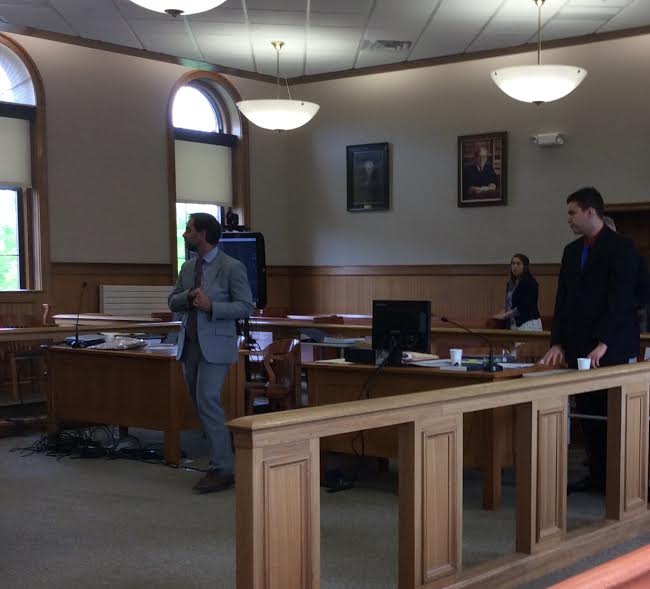
HOULTON, Maine — Closing arguments will begin Tuesday in the trial of a 20-year-old Houlton man accused of beating and stabbing to death 61-year-old Keith Suitter more than two years ago.
Reginald Dobbins, who was 18 when arrested and charged with murder by Maine State Police, has been on trial for the past six days in Aroostook County Superior Court in Houlton.
With defense attorney Hunter Tzovarras by his side, Dobbins told jurors and Justice Hal Stewart II on Monday that he would not take the stand in his own defense.
Another teenager, Samuel Geary, who was 16 when Suitter was killed, also was charged with the murder. After a judge ruled that he would be tried as an adult, Geary pleaded guilty in Washington County Superior Court in Machias on May 25. No sentencing date has been set yet for Geary. He was expected to testify at the trial, but Geary pleaded the fifth amendment against self-incrimination when called to the stand late Friday.
During hearings last year to determine whether Geary would be tried as an adult, Geary testified that Dobbins pressured him to take part in the crime after a day of drinking and using drugs. After he and Dobbins went to Suitter’s home to buy drugs, according to Geary, Dobbins pulled a hammer out of his jacket and struck Suitter with it.
Dobbins then asked Geary to stab Suitter, but Geary said he cut himself with the folding knife when he tried. That’s when Dobbins grabbed the knife from him and stabbed the victim, the younger defendant testified last year.
The state medical examiner previously reported that Suitter had blunt-force trauma consistent with having been struck 21 times with a hammer, and 10 stab wounds to the head and back.
Jack Dobbins, the father of Reginald Dobbins, testified for the defense Monday. He described picking up both his son and Geary on the night of the murder in the vicinity of the victim’s mobile home on Hillview Avenue where Suitter was killed on March 1, 2015.
Reginald Dobbins has maintained that he lent Geary his own long black trench coat on the night of the murder. The coat was later found spattered with Suitter’s blood.
Jack Dobbins told Assistant Attorney General John Alsop, who is prosecuting the case, that he saw his son get into the front seat of his car wearing a yellow jacket, while Geary was wearing the long black trench coat.
Several of his statements were conflicting, however, which the prosecutor pointed out to jurors. Initially, for instance, Jack Dobbins said that Geary had come over to the Dobbins home at “daylight” on the day of the murder, but later said it was “late afternoon.” The prosecutor also asked the elder Dobbins about telling a state police detective in an earlier interview that on the day of the murder, his son left the house wearing the black trench coat. On Monday, Jack Dobbins disputed ever saying that.
Alsop also asked Jack Dobbins about a statement he made to a detective during the investigation that the hammer police believe was the murder weapon was one that he recognized as coming from a barn on his Foxcroft Road property. On the witness stand, Jack Dobbins denied recognizing the hammer.
The hammer that is believed to have killed Suitter was found in a drawer in the Dobbins home. A knife that police say also was used in the murder was found in a hole in the wall in Reginald Dobbins bedroom. Jack Dobbins denied knowing anything about the knife, but admitted knowing about the holes in the walls.
“I did the same things when I was young,” he said, referring to punching holes in the wall.
Reginald Dobbins told police in interviews played in court during the trial that he and Geary, whom he repeatedly misnamed as Sam “McGeary,” had known each other for “two and a half to three years” prior to the murder. That contrasts with Geary’s statement that they had only known each other for a few weeks before the killing.
On Monday, Jack Dobbins also denied that his son and Geary had known each other for “years.”
After revealing that Reginald Dobbins would not take the stand, the defense rested its case.
Jury deliberations are expected to begin after closing arguments.







